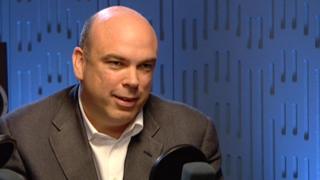Autonomy boss in ‘deliberate fraud’, court told

The founder of software giant Autonomy, Mike Lynch, “committed a deliberate fraud over a sustained period of time” to artificially inflate its value, the High Court was told on Monday.
Hewlett-Packard (HP) is suing Mr Lynch and former chief financial officer Sushovan Hussain for $5bn (£3.8bn).
They claim the two “artificially inflated Autonomy’s reported revenues, revenue growth and gross margins”.
The trial is believed to be the UK’s biggest civil fraud trial.
Hewlett-Packard (HP) paid $11.1bn (£8.4bn) in 2011 for the business.
The two men deny the claims and Mr Lynch, who was present at Monday’s hearing, has launched a counter-claim for at least $125m in damages against HP for “a series of false, misleading and unfair public statements” about his alleged responsibility for supposed accounting irregularities and misrepresentations at Autonomy.
‘Serious accounting improprieties’
The 53-year-old, from Suffolk, argues that, at the time of the sale, Cambridge-based Autonomy was an “innovative technology company and a success story” and that HP “botched the purchase of Autonomy and destroyed the company”.
The High Court also heard on Monday that HP announced it was writing down $8.8bn of Autonomy’s value just over a year after it bought the business, because, it said, it had found “serious accounting improprieties”.
HP’s barrister, Laurence Rabinowitz QC, said Mr Lynch and Hussain had knowingly caused Autonomy to “engage in a programme of widespread and systematic fraudulent” accounting practices ahead of the sale.
He said Autonomy had been “meeting its revenue and revenue growth targets by simply buying and selling third party hardware, without any connection to Autonomy software”.
‘No statesman’
In a written opening, running to 894 pages, he said Mr Lynch was “a controlling and demanding individual, who took a close interest in the progress of individual deals and sales generally”, and it was “inconceivable” that he was unaware of the fraudulent practices.
Robert Miles QC, representing Mr Lynch, said in written submissions that when HP bought Autonomy the company was “highly profitable” and “had a bright future”.
Mr Miles argued that HP “mishandled the acquisition”, adding: “Even the announcement of the bid was poorly managed, as it coincided with the announcement by HP of poor trading results, deteriorating prospects and the closure (or potential disposal) of significant parts of its business.”
He said that, as a result of “various failings”, HP’s “planned synergies were never achieved”.
He also submitted that HP had previously calculated that Autonomy could be worth as much as $50bn once integrated into its company.
A spokesman for Mr Lynch said ahead of Monday’s hearing there was “no fraud at Autonomy” and that the case “distils down to a dispute over differences between UK and US accounting systems”.
The spokesman added: “The real story is that HP, after a history of failed acquisitions, botched the purchase of Autonomy and destroyed the company, seeking to blame others. Mike will not be a scapegoat for their failures.”
In separate criminal proceedings in the US, Mr Lynch faces 17 charges of securities fraud, wire fraud and conspiracy in a federal court over the sale of Autonomy and, if found guilty, could face up to 25 years in jail.
Hussain was convicted last April in the US of wire fraud and other crimes related to Autonomy’s sale and is due to be sentenced in May, but is expected to appeal against that conviction.
The High Court hearing, which is expected to run for at least nine months, finishing in December at the earliest, continues.
Who is Mike Lynch?
- A Cambridge graduate who built Autonomy up to be one of the top 100 UK public companies
- Has an OBE for services to enterprise
- Is a fellow of the Royal Society
- Was previously on the boards of the British Library and the BBC
Autonomy was founded by Mr Lynch in 1996. It developed software that could extract useful information from “unstructured” sources such as phone-calls, emails or video, and then do things such as suggest answers to a call-centre operator or monitor TV channels for words or subjects.
Before it was bought by Hewlett-Packard, it had headquarters in San Francisco and Cambridge.
In 2010, about 68% of Autonomy’s reported revenues came from the US and elsewhere in the Americas.



